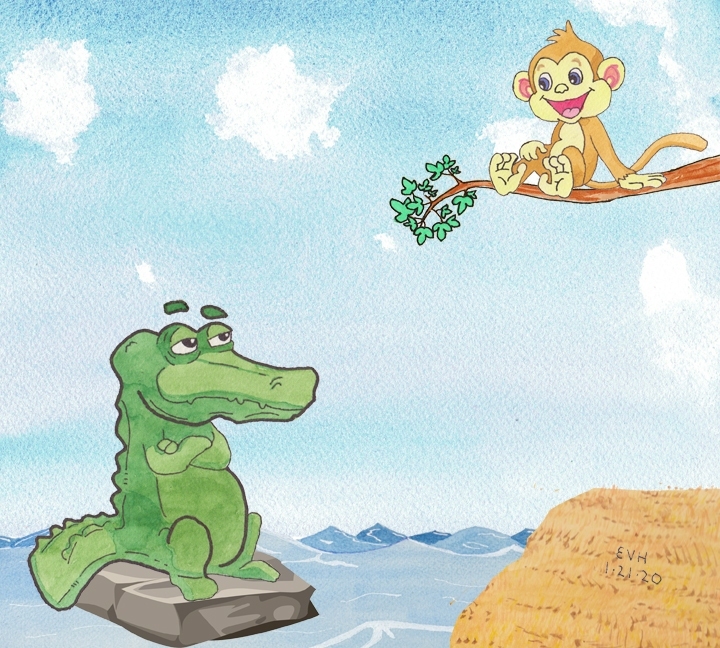
Jataka 208
Suṃsumāra Jātaka
The Crocodile and the Monkey
as told by Eric Van Horn
originally translated by William Henry Denham Rouse, Cambridge University
originally edited by Professor Edward Byles Cowell, Cambridge University
In this story a clever monkey outwits a dimwitted crocodile. The crocodile is nonother than Buddhism’s favorite punching bag, Devadatta.
“Rose-apple, jack fruit.” The Master told this story while he was at Jetavana. It is about Devadatta’s attempts to murder him. (These attempts by Devadatta to murder the Buddha are described in the Cullavagga.) When he heard of these attempts, the Master said, “This is not the first time that Devadatta has tried to murder me. He did the same before, and yet he could not make me afraid.” Then he told this story from the past.
Once upon a time when Brahmadatta was the King of Benares, the Bodhisatta came to life at the foot of the Himalayas as a monkey. He grew strong and sturdy, big of frame, well-to-do, and lived by a curve in the river Ganges in a forest haunt.
Now at that time there was a crocodile living in the Ganges. The crocodile’s mate saw the strong frame of the monkey, and she developed a longing to eat his heart (thinking it would make her strong). So she said to her lord, “Sir, I want to eat the heart of that great king of the monkeys!”
“Good wife,” the crocodile said, “I live in the water and he lives on dry land. How can we catch him?”
“By hook or by crook,” she replied, “he must be caught. If I don’t get him, I will die.”
“All right,” answered the crocodile, consoling her, “don’t trouble yourself. I have a plan. I will bring you his heart to eat.”
So when the Bodhisatta was sitting on the bank of the Ganges, after taking a drink of water, the crocodile drew near, and said:
“Sir Monkey, why do you live on stale fruits in this old familiar place? On the other side of the Ganges there is no end to the mango trees, and lakoocha trees (Artocarpus Lacucha, a fruiting tree native to India) with fruit sweet as honey! Is it not better to cross over the river and have all kinds of wild fruit to eat?”
“Lord crocodile,” the monkey replied, “as deep and wide as the Ganges is how shall I get across?”
“If you want to go, I will mount you on my back and carry you over.”
The monkey trusted him and agreed. “Come here, then,” said the crocodile, “up on my back with you!” and up the monkey climbed. But when the crocodile had swum a little way, he plunged the monkey under the water.
“Good friend, you are letting me sink!” cried the monkey. “What are you doing?!”
The crocodile replied, “Do you think that I am carrying you out of pure good nature? Not one bit! My wife has a longing for your heart, and I want to give it to her to eat”
“Friend,” the monkey said, “it is nice of you to tell me. Why, if my heart was inside me when I go jumping among the tree tops, it would be knocked to pieces.”
“Well, where do you keep it then?” the crocodile asked.
The Bodhisatta pointed to a fig tree that was full of ripe fruit not too far off. “See,” he said, “there is my heart hanging on that fig tree.”
“If you will show me your heart,” the crocodile said, “then I won’t kill you.”
“Take me to that tree, then, and I will show it to you.”
The crocodile brought him to the tree. The monkey leaped off of his back, climbed up into the fig tree, and sat down on one of the branches. “Oh silly crocodile!” he cried, “you thought that there are creatures that keep their hearts in a tree top! You are a fool, and I have outwitted you! You may keep your fruit to yourself. Your body is powerful, but you have no sense.” And then to explain this idea he uttered the following stanzas:
“Rose apple, jackfruit, mangoes, too, across the water there I see.
Enough of them, I want them not, my fig is good enough for me!
“Great is your body, verily, but how much smaller is your wit!
Now go your ways, Sir Crocodile, for I have had the best of it.”
The crocodile, feeling as sad and miserable as if he had lost a thousand gold coins, went back, sorrowful, to the place where he lived.

Figure: The Monkey Wins!
When the Master had ended this discourse, he identified the birth: “In those days Devadatta was the crocodile, the lady Ciñcā was his mate, and I was the monkey.”
(There is a story in the Pāli Canon about an attractive woman named “Ciñcā Manavika.” She was convinced by rivals of the Buddha to accuse him of impregnating her and being his lover.)
